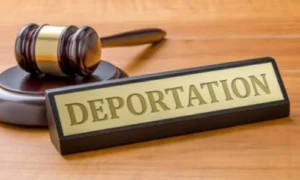Concerned about immigration issues following President Donald Trump's re-election? Click Here
 Facing the possibility of deportation can be a daunting experience for any immigrant. The thought of being forced to leave the United States and return to a potentially unsafe country while being separated from one’s family and community can be incredibly frightening. However, the U.S. legal system provides multiple ways for immigrants to fight against deportation. In many cases, this will involve making an argument to an immigration judge for why a person should be allowed to remain in the United States. However, even if a judge rules against a person and puts a deportation order in place, it may still be possible to appeal this decision.
Facing the possibility of deportation can be a daunting experience for any immigrant. The thought of being forced to leave the United States and return to a potentially unsafe country while being separated from one’s family and community can be incredibly frightening. However, the U.S. legal system provides multiple ways for immigrants to fight against deportation. In many cases, this will involve making an argument to an immigration judge for why a person should be allowed to remain in the United States. However, even if a judge rules against a person and puts a deportation order in place, it may still be possible to appeal this decision.
A ruling by an immigration judge can usually be appealed, and a person can request to have their case reviewed by the Board of Immigration Appeals (BIA). However, it is important to note that there are strict deadlines for filing an appeal with the BIA. Appeals must be made within 30 days after the immigration judge’s decision, and the Board must receive a Notice of Appeal within the applicable 30-day deadline. If an oral decision was issued in immigration court, a Notice of Appeal must be received within 30 days after the date of the decision. If a written decision was issued, a Notice of Appeal must be received within 30 days after the date the decision was mailed to the immigrant.
When filing a Notice of Appeal, it is crucial to provide detailed information about the reasons for the appeal. An immigrant will need to specify why they disagree with the ruling by the immigration judge, including any disputes about the facts of the case or the interpretation of the applicable immigration laws. They will need to identify the specific facts they are challenging and cite the laws, court rulings, or other legal authorities that may affect their case. If their appeal is related to humanitarian relief or other forms of discretionary relief, they will need to detail the specific issues related to their eligibility for relief or the exercise of discretion.
Most of the time, appeals are reviewed by a single member of the Board, although a person may request to make oral arguments before a panel of three Board members. These reviews are usually only granted in specific circumstances, such as when multiple immigration judges have made inconsistent rulings on a case, when there were clear factual errors in a judge’s ruling, when a judge’s decisions did not comply with the applicable immigration laws, or when the issues in a case are of national importance. In cases involving oral arguments, an immigrant will usually be required to file a brief that fully details the reasons for their appeal and their arguments related to the judge’s ruling. A brief may also be filed in other cases, and the information provided in a brief will be considered by the Board member reviewing the appeal.
During an appeal, the BIA will review the facts of a case and the arguments made by both sides to determine if the immigration judge made any errors. In some cases, the BIA may remand the case to the immigration court to correct any mistakes that were made, or it may reverse the judge’s ruling and allow an immigrant to remain in the United States. If the BIA chooses to affirm the immigration judge’s ruling, the deportation may proceed. If necessary, an unfavorable decision by the BIA may be appealed in federal court.
For those who are involved in deportation proceedings, determining the available options is not always easy. Fortunately, there may be ways to prevent deportation, even if an immigration judge has ruled that a person should be removed from the United States. At John W. Lawit, LLC, we can help pursue appeals of deportation orders or other decisions by immigration judges. We work to protect the rights of immigrants and their families, and we can provide guidance on the steps that can be taken to address deportation and other immigration issues. Contact our Arlington immigration appeals attorneys at 214-609-2242 to set up a consultation today.
Sources:
https://www.justice.gov/eoir/board-of-immigration-appeals
https://www.justice.gov/eoir/page/file/1327636/download